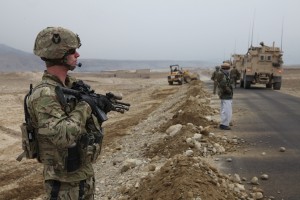The fact that many soldiers suffer from brain damage after combat is no new discovery. One difficult soldiers experience is with tasks requiring memory or attention.This is a potentially devastating side effect of serving your country. Because of the weight of this debilitating deficit, scientists continue to research the effect military combat can have on the brain. A study that began by testing the way the brains of “healthy Dutch soldiers” respond to stress in normal life led to important discoveries about the way the brain responds to stress after combat.

This is an American soldier in combat who is subject to the “adverse stress reactions explored in this article.
The areas of the brain that suffer notable damage are the mid-brain and the prefrontal cortex. As before mentioned, these parts of the brain are associated with memory and attention. Soldiers were tested on their memory and attention skills before combat and then again after returning from combat. There were significant differences in the two studies, with alarmingly lower scores in the second round of testing. There is lower activity in the mid-brain and the prefrontal cortex and also a weaker connection between the mid-brain and prefrontal cortex. However, scientists determined that in most cases the brain can heal and return to normal functioning levels after a year and a half.
This was an exciting discovery because it gives hope to any soldiers suffering from the “adverse effects of stress”. This is also an important discovery because it leads to the suggestion of longer periods of time between combat tours. It is uncertain whether or not the brain can heal after “Multiple stressful deployments in quick succession“.
I think it’s important to fully consider giving soldiers more time to recover between tours. This would hopefully prevent long-term damage to vital brain functions.
This issue and discovery are even more relevant to Americans because of the links in brain trauma due to combat and brain trauma due to football. The leaders of the NFL and of the US Army are working together to “improve awareness of traumatic brain injury and further research into its causes, prevention and treatment.” This collaborative effort is focused on prevention of traumatic brain injury by promoting early detection of concussions. If a soldier or player is aware of his or her concussions as they happen they are more likely to take time off to heal before re entering the battle field or playing field.
Photo Link:
http://www.fotopedia.com/items/flickr-5367561962
Related Links:
http://www.huffingtonpost.com/2012/09/24/broken-after-battle-comba_n_1910802.html
http://www.nlm.nih.gov/medlineplus/news/fullstory_128913.html


jk1234
It’s terrifying how brain trauma cases in the NFL has become such a large problem that according to this article: http://news.blogs.cnn.com/2012/06/07/2000-players-unify-in-suing-nfl-over-head-injuries/
about 2,000 ex-players have sued the NFL over long-term brain injuries caused by concussions during their playing careers.